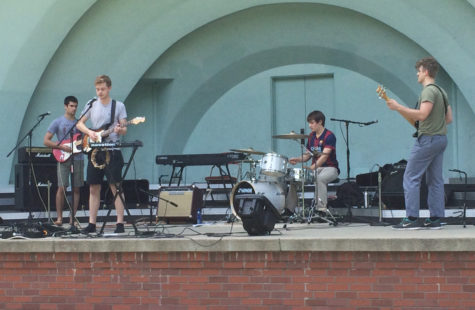SUB discusses finances with Student Government
October 26, 2015
Negotiations for a three-year funding contract are in the works between Student Union Board and Student Government.
This contract would be similar to the proposal the Board presented to the Senate last spring, requesting about $100,000 each year to fund national events on campus.
The senate failed to pass the contract due to lack of funds and differing opinions between senators. Both the Senate and the Board are hopeful that the negotiations will eliminate any questions of the contract’s feasibility.
“Hopefully if we have a contract it’ll be something we can afford,” said Hamad Abbas, financial director of Student Government. “That’s my goal. I’m not going to put anything forward that we can’t afford.”
Typically student organizations request funds from the Senate in the fall for the next school year. The contracts requested last spring and currently under negotiation would eliminate the Board from that yearly process.
For student organizations to request funding, they must create their own budgets with best estimations of expenses using an online system provided by the Senate.
Organizations then meet with the Senate to review the budget allocations so the Senate can decide to adjust or approve the budgets at their next meeting.
The Board’s vice-president of finance, Gretchen Tiedeman, said funding the Board on a three-year contract would increase the Board’s chances of booking better-known artists.
“When you have a one year contract you don’t exactly know what funds you’re going to have,” Tiedeman said. “So if there are different improvements you want to be making in the future, then a three year contract would improve that planning process, especially with our national events. If we want to get bigger names, it’s harder to plan and get things lined up for the next semester.”
The Board presented their original proposal and a revised version to the Senate last school year, where both were heavily debated among senators.
“Some people had the reason that they were much more comfortable with a year-to-year thing and some people who believed that we just couldn’t afford it,” Abbas said. “The Finance Director [at the time] did kind of come out and say we couldn’t afford it, so once he said that it was kind of a shut case.”
Abbas said there was also discussion last year as to whether the Senate should be funding events that are not benefitting students’ education.
“There is fundamental belief by some generally that maybe we shouldn’t be funding concerts and more towards conferences and all that stuff,” Abbas said.
The Board received funding from the Senate for the 2015-2016 school year through the usual allocation process after the contract failed to pass.
However, it has been difficult to find large-scale acts to come to Iowa State, said George Micalone, director of student activities.
“Unfortunately without the advance commitment, we’re really one show at a time,” Micalone said. “With the advance commitment, we can look at two, four, five, eight shows at a time because we know the money will be there.”
Abbas said the negotiations between the Senate and the Board have been productive and will most likely reach the Senate late this month.
“I think there is a good chance it could roll through, all pending the Senate’s approval,” Abbas said. “I’m just making sure it’s feasible for the Senate, that way they can debate the actual merit of it, not whether it’s affordable or not. I’m going to try and put forth something we can afford and that’s for them to decide.”














